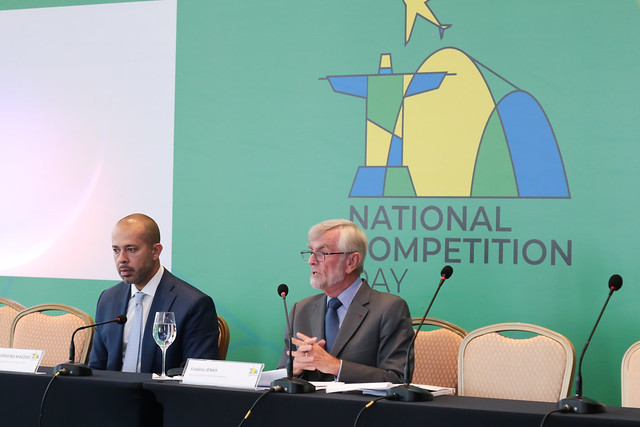2022 Latin American and Caribbean Competition Forum
 27-28 September 2022
27-28 September 2022  Rio de Janeiro, Brazil
Rio de Janeiro, Brazil
|
The 20th meeting of the Latin American Competition Forum took place on 27-28 September 2022 in hybrid format in Rio de Janeiro, Brazil. It was hosted by the Administrative Council for Economic Defense (CADE) and co-organised by the OECD and the IDB.
PROGRAMME AND DOCUMENTS: Agenda • Orden del día
Summary record • Pictures • Acta resumida
|
View pictures of the 2022 edition
|
Session 1. Strengthening incentives for leniency agreements |
|
Leniency programmes have played an important role in cartel enforcement in the Latin America and the Caribbean region, complementing ex officio investigations efforts. By 2020, at least 12 countries in the region have adopted a leniency programme, i.e. Argentina, Brazil, Chile, Colombia, Costa Rica, Ecuador, El Salvador, Mexico, Nicaragua, Panama, Peru and Uruguay demonstrating a generalized consensus about the usefulness of this enforcement tool. This LACCF session discussed the recent trend related to the decrease of leniency applications, its causes and ways to address this issue by strengthening the incentives for leniency policy. Speakers
Scott D. Hammond, Partner, Gibson, Dunn & Crutcher and co-chair of the firm’s Antitrust and Competition Practice Group Bio
Natalie Harsdorf-Borsch, Acting Director General, Federal Austrian Competition Authority Francisco Schertel Mendes, Legislative Consultant of the Federal Senate in the areas of Economic Law, Business Law and Consumer Law Bio Contributions from participants Presentation
Suggested bibliography and related links
|
Session 2. Market Definition in the Oil and Gas Sector |
|
Oil and natural gas are major energy sources in the world and play a key role in the global economy including in Latin America and the Caribbean. They represent together around 67% of the world’s total final consumption by energy source, followed by electricity related sources (i.e. hydroelectric, nuclear plants), biofuels, and coal. The figure is similar in Central and South America, where they represent together around 60% of total consumption by energy source. When considered the total supply of energy, they also represent a significant share and reach almost 90% of total energy supply in certain Latin American countries such as Mexico (IEA, 2021). This session focused mainly on competition enforcement of market definition issues in the downstream segment of the oil and gas industries. Both product and geographic dimensions were addressed as they play an important role in the assessment of market power and consequently the competition analysis in concrete cases. This may include updates in methodologies to improve the definition of relevant markets, the interplay between products that have some degree of substitutability but are usually defined as separate relevant markets, tying and bundling strategies, vertical integration matters, and the general legal requirement to define relevant markets in enforcement cases. The session intended to cover the legal, economic, and practical dimensions of market definition in the gas sector. Background documentation Call for contributions • English | Español OECD Issues Note • English | Español
Speakers Vinicius Carvalho, Professor, University of São Paulo and former President, CADE, Brazil Bio Javier Tapia, Executive-Director, Asociación de Transmisores and former Judge at Competition Tribunal, Chile Pablo Trevisan, Lawyer-Partner Trevisán Abogados, and former Commissioner, CNDC, Argentina Pamela Sittenfeld, Chief of staff, Minister of Foreign Trade, Costa Rica
Contributions from participants European Union English | Español Presentations
|
||
|
Suggested bibliography and related links (Full bibliography available in the call for contributions)
|
||
Session 3. Media mergers
|
||
|
The media industry is very broad and includes several services. The media sector incorporates both the production of content, such as news, entertainment, education and research, as well as its distribution through the means of mass communication. Mass media includes the press, television and radio broadcasting, film producing, video streaming, video games, online publishing, social media and podcasting, among others. As it has been witnessed, the media industry is constantly evolving, driven recently by the digital economy, new and disruptive digitization technologies, the emergence of global and local market participants, and new distribution channels, propelled by technological convergence or evolution, all of which have had impacts in media value chain dynamics. This session focused on the assessment of media mergers considering the new configuration of the media industry driven by the technological evolution and changes in consumer behaviour, as well as the growing importance of online services and large tech companies. In particular, the session considered the role played by the digital platforms and the OTT content distributors in the media industry, and their competition implications. Background documentation Call for contributions • English | Español OECD note • English | Español
Mexico • English | Español
Speakers Martin Peitz, Professor of Economics, at the University of Mannheim Feng Zhu, Professor of Business Administration, Harvard Business School, Harvard University Bio Diana Moss, President, American Antitrust Institute Aleksandra Boutin, Founding Partner, Positive Competition Bio Presentations
Suggested bibliography (Full bibliography available in the call for contributions)
Competition Law and Policy in Latin America
|
||
|
Other meetings of the week |
||
|
27 September 2022: National Competition Day of Brazil English 29 September 2022: Ibero-American Forum on Competition English | Español 29 September 2022: Meeting of the Regional Competition Center for the Americas (CRC) English | Español |
Related Documents



